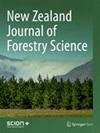Impacts of tending on attributes of radiata pine trees and stands in New Zealand – a review
IF 1.1
4区 农林科学
Q2 FORESTRY
引用次数: 0
Abstract
Background: Radiata pine (Pinus radiata D.Don) has been grown in New Zealand’s plantations for more than a century, and silviculturists began by employing Eurocentric ideas about how to manage forest stands. Research and development gradually led to an entirely new approach to silviculture, where volume production was sacrificed to promote value, and high investments in individual trees led to very low stand stockings by international standards. Methods: The development of pruning and thinning technology was reviewed, highlighting the most important developments, and identifying impacts of tending on tree and stand attributes. Results: Decision-support systems for planning pruning and heavy, early pre-commercial (waste) thinning became very sophisticated. As ideas changed, however, structural regimes without pruning became more prevalent, and this has necessitated new forms of silvicultural research. Ideas for new areas of tending research in New Zealand are outlined. Conclusions: A unique approach to tending plantations developed in New Zealand that involves sacrificing volume production to increase the value of an investment in pruned forest stands. Experiments aimed at building decision-support systems for these silvicultural regimes have yielded a great deal of information about impacts of pruning and thinning in stands with relatively open canopies. Recent changes in focus towards growing construction lumber require a greater research focus on factors influencing wood stiffness and stability as well as a clear understanding of the use of higher stocking levels with a variety of genotypes on a range of sites. Stand dynamics and mortality will be more relevant than for pruning regimes, and a variety of new experiments is required.抚育对新西兰辐射松林分属性的影响
背景:辐射松(Pinus Radiata D.Don)在新西兰的种植园中种植了一个多世纪,林业学家开始采用以欧洲为中心的理念来管理林分。研究和发展逐渐导致了一种全新的造林方法,在这种方法中,为了提高价值而牺牲了批量生产,对单株树木的高投资导致了按照国际标准非常低的林分长袜。方法:综述了国内外修剪间伐技术的发展概况,重点介绍了修剪间伐技术的研究进展,并分析了抚育对林分属性的影响。结果:规划修剪和重,早期预商用(废物)间伐的决策支持系统变得非常复杂。然而,随着观念的改变,没有修剪的结构制度变得更加普遍,这就需要新的造林研究形式。概述了新西兰抚育研究新领域的想法。结论:在新西兰开发了一种独特的抚育人工林的方法,该方法涉及牺牲产量以增加对修剪林分的投资价值。旨在为这些造林制度建立决策支持系统的实验已经产生了大量关于对树冠相对开放的林分进行修剪和间伐的影响的信息。最近对日益增长的建筑木材的关注变化要求对影响木材刚度和稳定性的因素进行更大的研究,并清楚地了解在一系列地点使用各种基因型的较高放养水平。林分动态和死亡率将比修剪制度更相关,需要进行各种新的实验。
本文章由计算机程序翻译,如有差异,请以英文原文为准。
求助全文
约1分钟内获得全文
求助全文
来源期刊

New Zealand Journal of Forestry Science
FORESTRY-
CiteScore
2.20
自引率
13.30%
发文量
20
审稿时长
39 weeks
期刊介绍:
The New Zealand Journal of Forestry Science is an international journal covering the breadth of forestry science. Planted forests are a particular focus but manuscripts on a wide range of forestry topics will also be considered. The journal''s scope covers forestry species, which are those capable of reaching at least five metres in height at maturity in the place they are located, but not grown or managed primarily for fruit or nut production.
 求助内容:
求助内容: 应助结果提醒方式:
应助结果提醒方式:


